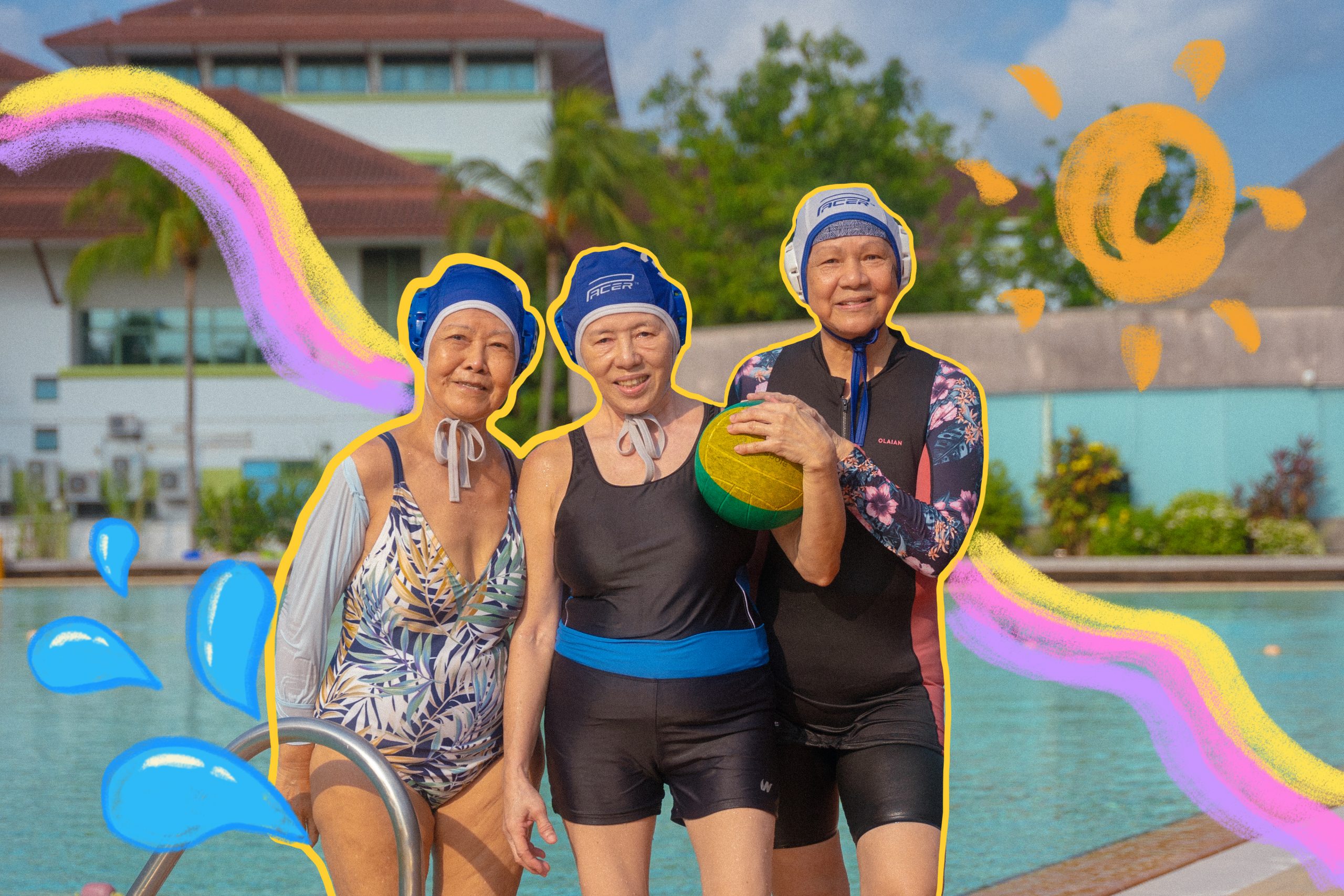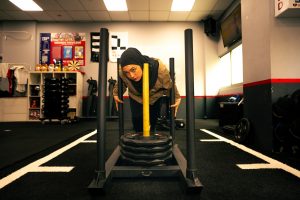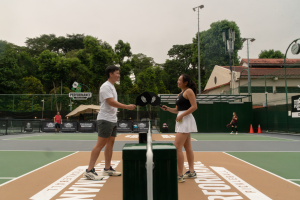All images and illustrations by Xue Qi Ow Yeong and Michele Pek for RICE Media unless stated otherwise.
The whooping and hollering can be heard from the entrance of Yio Chu Kang Swimming Complex.
It’s bright and early on a Tuesday morning—way too early in the day and week for a ruckus. I hear splashing, shouts of “pass the ball!” and various expletives in Hokkien and Cantonese. Who are these ruffians disturbing the 8 AM peace?
In the pool are 20 or so Ah Mas (Chinese for grandmother) wrestling each other. They’re here every week to play Flippa Ball, a modified version of water polo. It’s the first time I’ve seen so many grandmas in one place. It’s also the first time I’ve seen an 80-year-old lady dive headfirst for a ball.
They pause their game briefly to wave at me. “Ah Moi’s granddaughter!” they titter amongst themselves.
My grandma was one of the founding members of Ah Ma Flippa Ball; she played religiously every week till she passed in 2019.
As I watch Ah Mas shoulder-check each other in the pool, I’m struck with a strange sense of pride at the legacy my grandmother left behind.
She refused to sit around and spend her last years being lonely or dreading death. She wanted to age in a way that was brash and unapologetic, and she helped create a community for other fellow Ah Mas to do exactly that.
They love playing ball. And they share the same belief: “I’ll play till I die”.
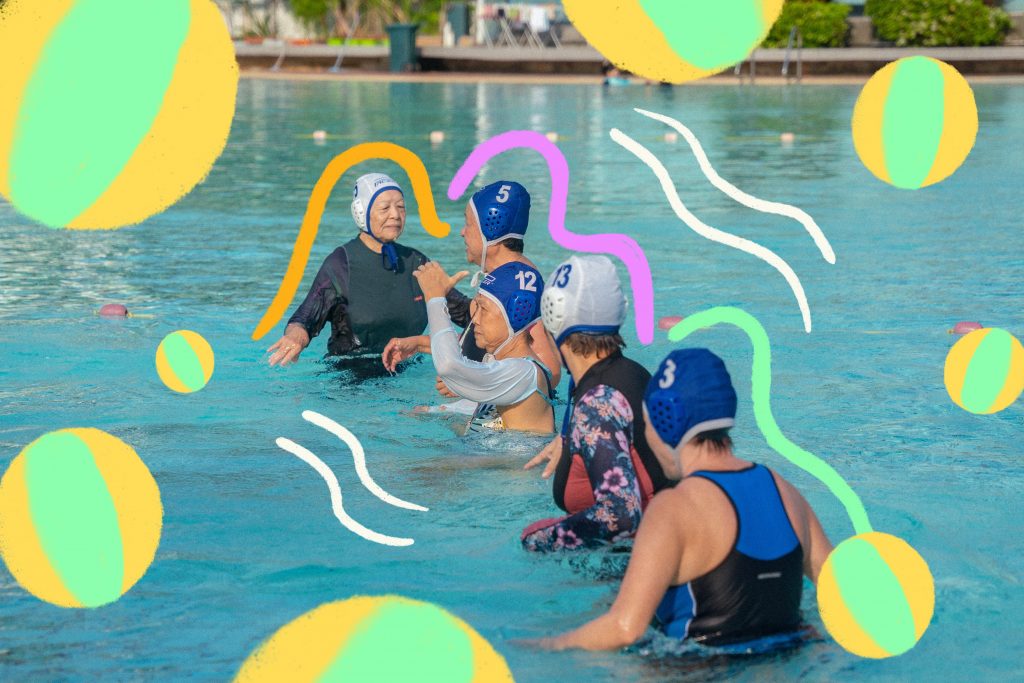
Healing Their Inner Child
They weren’t always playing water polo. In 2016, the founding members of Ah Ma Flippa Ball started off swimming.
Slow swimming is a common form of elderly exercise, alongside Tai Chi, Qigong, and nice little strolls around the park. But my grandmother would groan to me at every family gathering: Qigong is just standing around and posing, she would say. Swimming is so boring.
She tried to spice it up by sneaking into SAFRA—my father recalls fondly how my grandmother got ahold of my family’s SAFRA membership cards to enjoy the clean changing rooms and larger variety of pools.
But it was far too popular. Too many grannies were sneaking into SAFRA to be ignored, especially since they were often loud and rowdy in the common pools. The lifeguards had to give them a stern warning and send them packing to Toa Payoh Swimming Complex.
Back to boring old laps it was. Until 55-year-old Ting Kum Luen, their current coach, got involved that same year.
“I used to teach kids an easier form of water polo called Flippa Ball on Saturday mornings,” he explains. “One day, the Toa Payoh Swimming Complex manager came up to me and asked, ‘Eh, this one Ah Mas can do or not?’”
The group started with around nine to ten members, but now there are over 20 ball-slinging Ah Mas generally ranging from 65 to 84 years old (with the exception of two Gen X members.) They’ve since moved away from Toa Payoh Swimming Complex due to renovations, but the members don’t mind the extra travel to Yio Chu Kang.
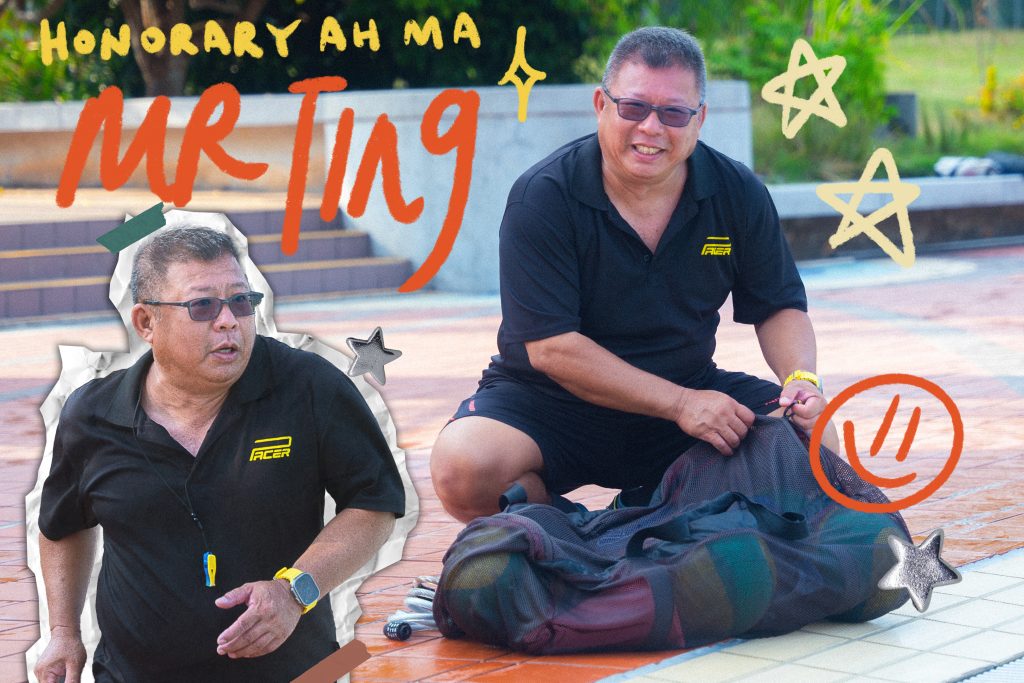
Initially, Kum Luen was sceptical about how strong the Ah Mas could be. Even though they aren’t strictly playing water polo, certain elements still remain: traversing the pool (albeit by walking), passing and catching the ball, scoring goals into a net, etcetera.
Would the frail old Ah Mas take well to the intense sport of Flippa Ball? Or would they die trying?
But they surprised him. They became so invested in the game to the point of screaming and shouting.
“My 16-year-old grandson came down to watch us play and called us chor lor (Hokkien for rowdy),” Ah Nam laughs. She’s 70 this year; but given how many octogenarians there are in the group, she quips that she’s one of the youngsters.
“We love to argue back and forth with Mr Ting,” 75-year-old Mei Mei says. But Kum Luen doesn’t take the insubordination to heart.
“They’re not frail. Those old ladies are feisty. When they fight with me, I know they’re having fun,” he says.
On the surface, they’re a bunch of rebel seniors who throw down in the pool. But there’s something deeper behind the rowdiness, Ah Nam explains.
“I’ve spent most of my life being a wife, then a mother. But Flippa Ball makes me feel like a kid again, doing what I want.”
She gets a little emotional at this. “I’ve always been fun, I just forgot about it till now.”
“我终于找回了自己 (I’ve finally found myself again).”
At every stage of their adult life, these Ah Mas have been inundated with expectations: first, a dutiful wife. Then, a devoted mother. Now, national narratives surrounding graceful ageing paint our grandmothers as cute, frail, and docile.
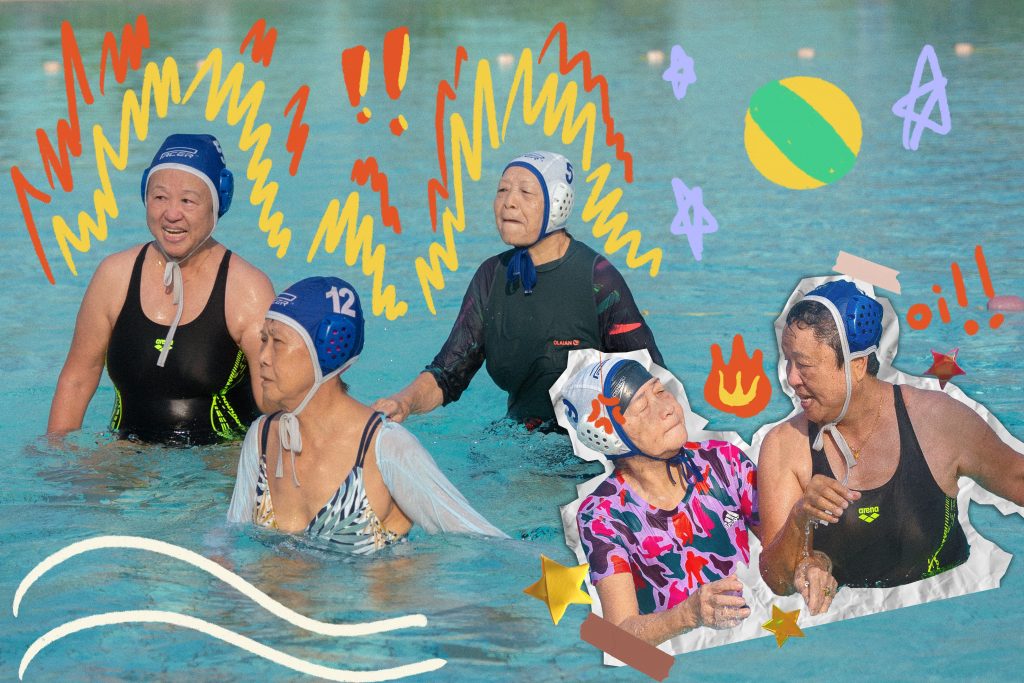
There’s a shred of truth in that. Some members of Ah Ma Flippa Ball struggle with their mobility and can’t walk long distances. But slinging balls and screaming has allowed them to unleash their inner child—or more precisely—let them act out and be childish.
Essentially, they’ve gone back to a time when they weren’t just wives, mothers, or grandmothers; they’re exploring their fun, raucous sides. Ah Mas deserve to heal their inner child, too.
Water Polo Dreams
There are the obvious physical benefits of elderly exercise. Kum Luen tells me how he’s noticed a real improvement in their mobility and mental acuity.
“Since it’s a team sport, there’s some strategy involved, like marking players and remembering the rules. It helps them keep their mind sharp.”
“Their reaction speed has also improved tremendously,” Kum Luen impresses upon me how important that is. “One of the members recently fell at home. Falls are no joke at that age, but she was able to react fast enough to catch her fall.”
True to Kum Luen’s words, these Ah Mas are undeniably fit. During their session, I regularly see them lob the ball across the length of the pool. One Ah Ma tries to do a jump smash into the net. Their display honestly rivals my school’s water polo team.
But while they fight hard in training, once they exit the pool, they’re absolute besties.
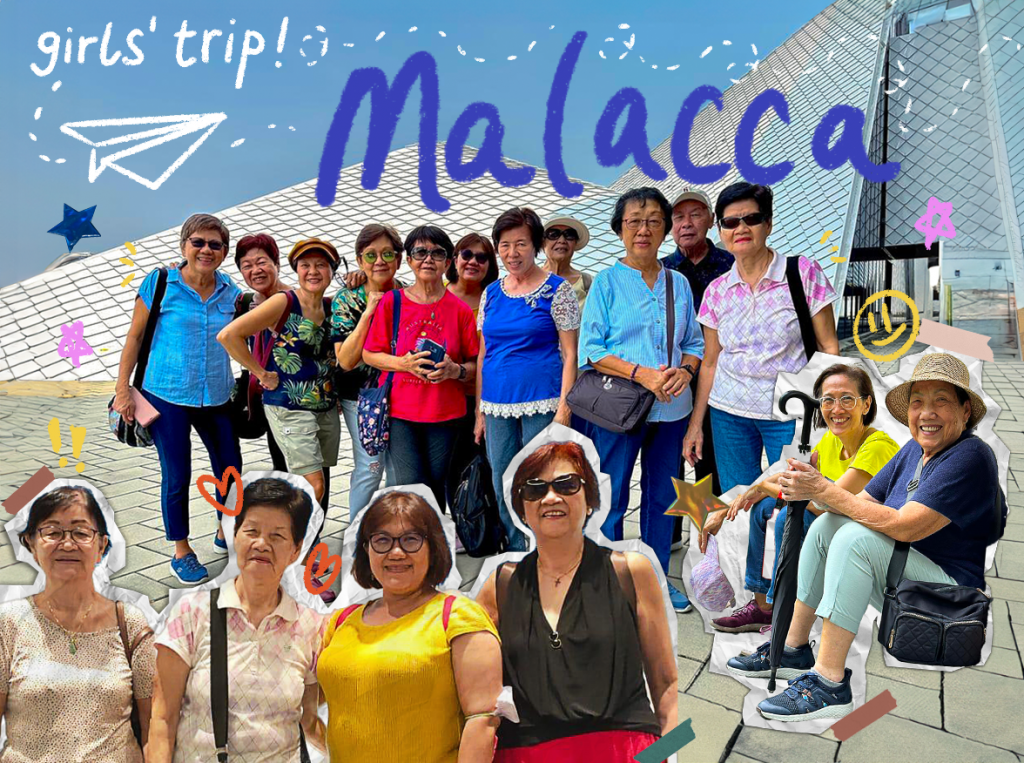
They regularly sing karaoke and play Mahjong together. And these Ah Mas have little girls’ trips too: They’ve been to Kukup, Johor Bahru, and Malacca. In September, they’re heading to Hat Yai in Thailand.
This sense of community and friendship has coloured all their major milestones. 73-year-old Ah Kee recounts their time in Ipoh after the pandemic in 2022, when they flew to play a friendly against a team of middle-aged Malaysian mothers.
“It was just an excuse to play. We weren’t thinking about winning or losing,” Ah Kee says. “And all I remember is the delicious food I ate with my friends.”
Among their ranks now is 45-year-old Britta Coombes, a German Permanent Resident who joined the team in April 2023. “I was just swimming innocently when I heard their laughter. I kept watching them longingly. I must have looked like a stalker,” Britta laughs.
“The next week, I begged them to let me play. And when they added me into their Whatsapp chatgroup, I felt like I’d joined the cool kids club.”
She doesn’t speak much Chinese, but she knows when they’re referring to her in the pool. “Whenever I hear someone shout ‘Ang Moh!’, I know the ball is coming.”
“I’m an Ang Moh half their age, but I never felt like an outsider,” Britta smiles. “I just feel so loved by them. I took a little break from playing because of work, but they moved it to Tuesday mornings when I’m free just to accommodate me. And when I came back, they hugged me so tightly, telling me how much they missed me.”
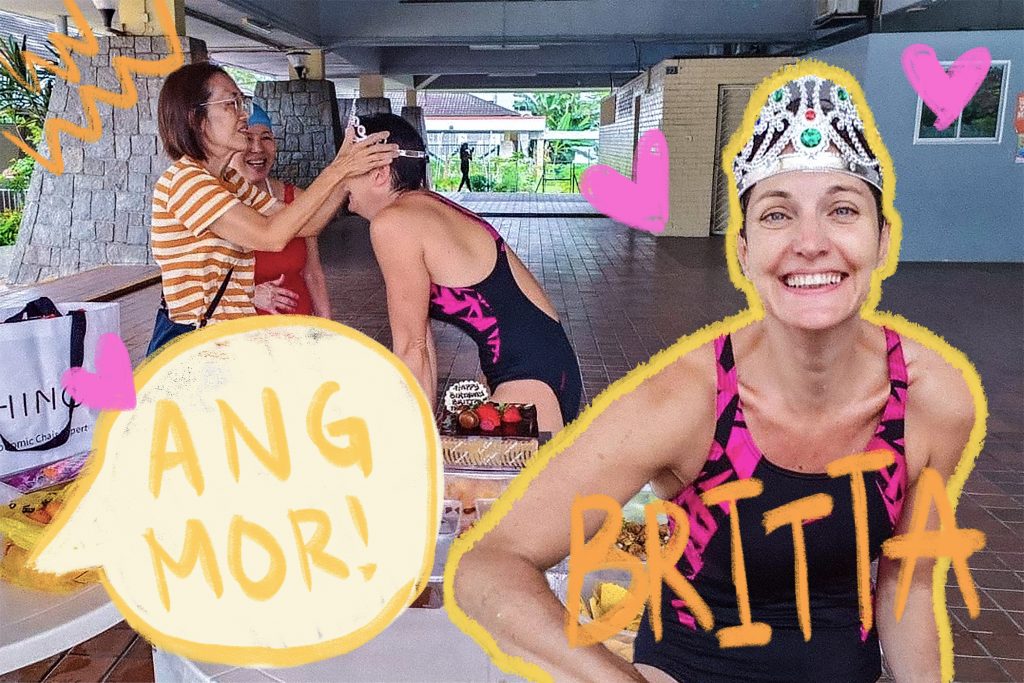
Like Britta, Kum Luen is also an honorary Ah Ma. He reveals that he does this pro bono in addition to his work in his water polo academy. He has rearranged meetings and overseas commitments just to make it to the Yio Chu Kang Swimming Complex on Tuesdays at 8 AM.
It’s a funny sight watching them walk out of the swimming complex—a brawny middle-aged man and a tall Caucasian woman flanked by cooing grandmothers with their foldable trolleys.
But the best communities are the ones formed unexpectedly. Their connection and love is genuine and organic. It’s why they’ve lasted nearly a decade, as Kum Luen explains.
The Ah Mas weren’t all friendly and bubbly when they started. Ah Kee tells me about Li Fang, their 81-year-old goalie. She used to be sad and withdrawn. She’d quietly stand at the goalpost, barely reacting to balls being lobbed at her.
But she’s made a complete 180: “After a couple of months of playing with us, [Li Fang] changed. She’s diving after the ball and saving goals left and right. She’s laughing and having fun.” By their accounts, Li Fang became energetic and happy.
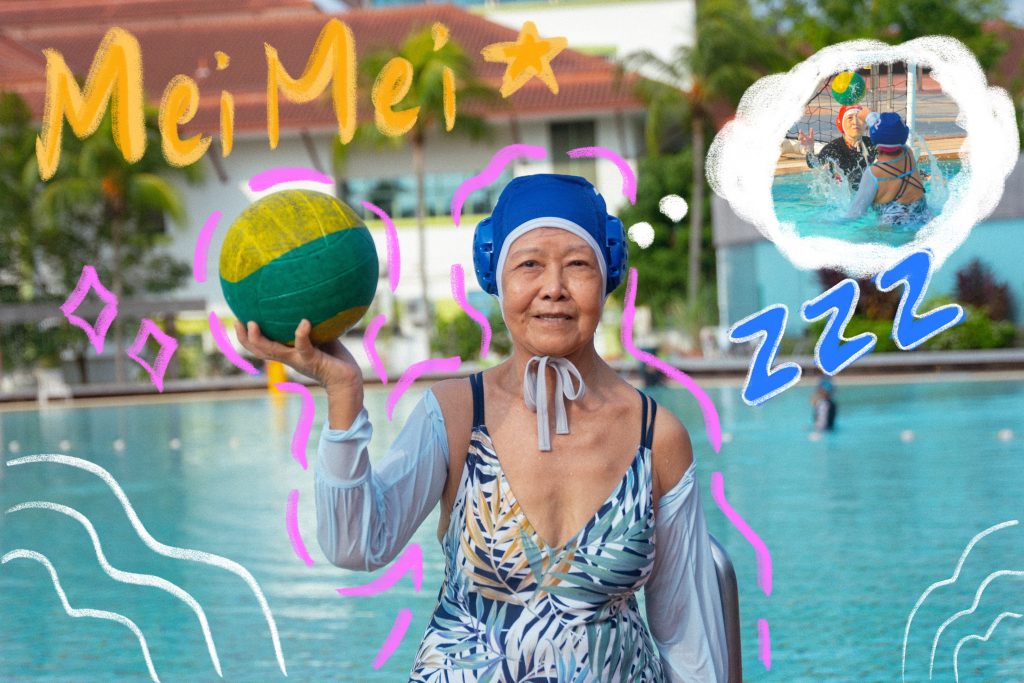
Mei Mei jokes that she dreams about blocking goals when she goes to sleep—that’s how serious Flippa Ball is for her. After she leaves, Ah Nam explains why.
“Mei has lived alone ever since her daughter and husband moved to Australia. She’s very lonely, and that’s why she dreams about us.”
I come to understand how important their weekly sessions are, especially for members like Mei Mei who’re suffering from elder loneliness or members like Li Fang who grapple with sadness.
Cursing, tackling each other, thrashing it out in the pool; there’s something very freeing about behaving stupidly. Not only does it break the more introverted grannies out of their shell, their weekly throwdowns are sometimes their only form of social interaction for the week.
When they’re playing ball with their friends, they feel seen and heard. A team player with a purpose.
Death, Dying, and Water Polo
The topic of death comes up for some reason. I guess we’re all thinking of my grandmother.
“Ah Moi was a really fast swimmer,” Ah Kee reminisces.
Truth be told, I never knew much about her outside of her role as my ‘grandmother’. She’d host family gatherings and cook up a storm. She’d ask me how I was doing in school and remind me to study hard. Prim-and-proper Ah Ma behaviour.
The only time I saw an unfiltered side of her was when I chanced across her smoking secretly at a HDB void deck, leg up on the bench like a gangster.
But as I talk to her friends, I feel like I’m getting to know my grandmother as a person. The real Ah Moi. They tell me how much she used to swear—or more specifically—bitch about my grandfather. She was like the Ah Ma equivalent of a jock: she loved being active and playing different kinds of sports.
My grandmother isn’t the only member they’ve lost. They speak frankly about how they’ve lost other members to Covid as well, and they make it a point to attend funerals together as a team.
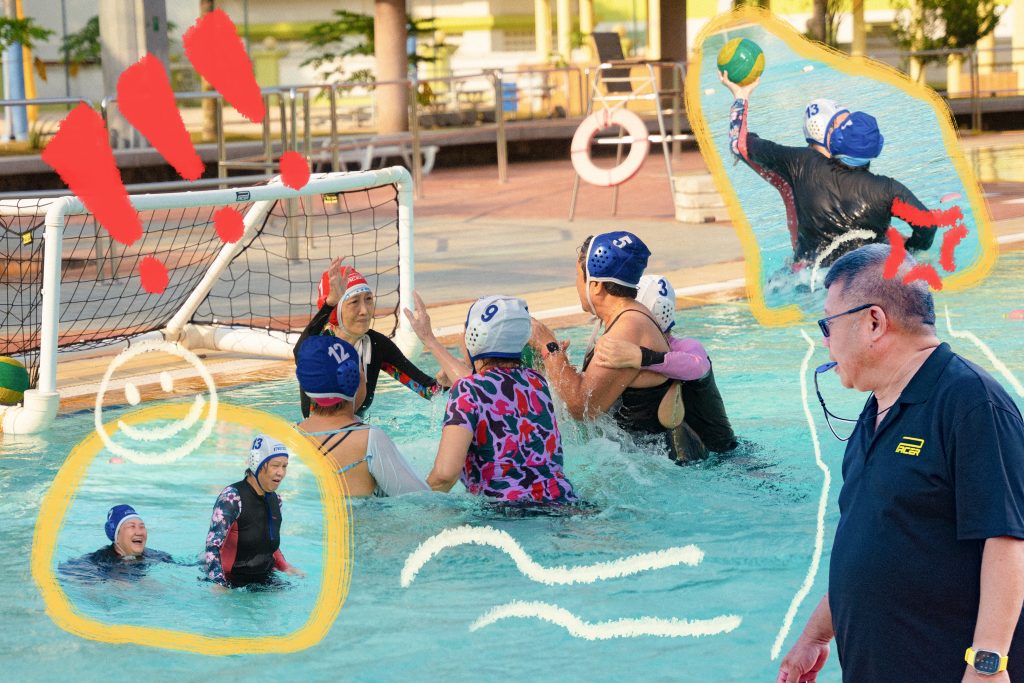
Surprisingly, they keep the discussion light, grinning with the same vigour as when they’re in the pool. “I’m focusing on what I want to do now and having fun with my friends. It’s the perfect way to spend my last good years,” Mei Mei smiles at me.
“I want to play till I die,” Ah Nam announces. The others chorus in agreement.
Even Kum Luen says the same thing. “I’m so proud of this community we’ve built. I want to coach them till I die, too.”
With all this talk about death, I’ve run out of wood to touch.
Mortality is a fact often ignored in our discussion of graceful ageing. The focus has obviously been on how we support our elders in their retirement years: focusing on their frailty, propensity to illness, and mental health.
But truthfully, they’re existential beings. They’re hyper-aware of the fact that any one of them might pass soon. They’re constantly grappling with the fear of death.
“They all know (they might pass on soon), but they get so much joy by being together that it outweighs the fear or dread of waiting to die,” Britta offers.
The little community my grandmother helped form has done so much more than help put a smile on their faces. It allows these Ah Mas to mourn together and, crucially, confront death together.
It’s not just about splashing around in the pool. It’s about living your last years unapologetically yourself.
And I’m glad my grandmother got to do exactly that with them.

Playing Till They Die
At 9 AM, they officially end training. They become subdued again as they meander out of the pool. Some are off to hang out with each other at a coffee shop nearby. Others are going home for a nap, maybe they’ll meet later for dinner.
Water polo is energetic, fast-paced, and aggressive—not adjectives you’d typically use to describe an elderly Singaporean lady. But maybe it’s a necessary shake-up from the fragile way society treats them. With every ball they lob or every tackle they make, they’re proving that they still have lots of life left in them.
And instead of waiting for death to take them in the solitude of their home, they’re out there in the pool having fun with their friends. It’s defiant. It’s rebellious. It’s exactly the freeing feeling they need to confront the tail end of their lives.
While I’m in the middle of thinking about death, Ah Nam asks me, “Are you coming next week to play with us?”
Me? Jump in the pool and play modified water polo with a bunch of Ah Mas? It’s absurd.
And frankly, so many things about this situation are absurd. The fact they’re playing water polo at their old age. Their dreams about playing ball at night. Their frank optimism towards mortality.
But their joy is so infectious. “Okay,” I laugh. “See you in the pool next week.”

